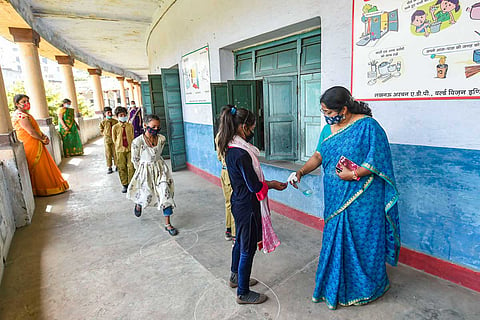

The second wave of the COVID-19 pandemic in India is on the decline, and many states are slowly and cautiously lifting restrictions in phases. However, though the academic year has begun, schools across the country are closed and classes are being held online. With speculation that a possible third wave will affect children more, there is uncertainty about when schools can reopen on ground. Currently, vaccination is open to everyone above the age of 18 in India. Covishield, Covaxin Sputnik V are the vaccines that are presently available.
Even as states and the Union government wrangle over pricing, procurement and shortage, there is anxiety among parents and educators about letting children go to school, whenever they reopen, without vaccinating them. While the US has started vaccinating children above the age of 12 with the Pfizer vaccine for COVID-19, Moderna may also soon be authorised for the same. However, neither vaccine is currently available in India.
Bharat Biotech has started Covaxin trials on children in the 12-18 years category. According to reports, children have been divided into three age categories for the trials - 12-18, 6-12 and 2-6 years. However, Covaxin is yet to publish its Phase 3 results (for adults) in a peer reviewed journal and neither has it been approved by the World Health Organisation as of now. But is it necessary for schools to remain closed till all children are vaccinated? TNM spoke to Dr K Srinath Reddy, President, Public Health Foundation of India, to get his views on reopening schools.
There are four questions embedded in your question. Will children be infected? Will they be infected more than in earlier waves? Will they be affected more than adults, in numbers infected? Will they be affected more severely than adults? Each of those requires a separate answer.
Children will be infected if they are exposed while the virus is in active circulation. Since they were mostly sheltered during the first wave and partly so in the second wave, greater numbers of the children will still be susceptible to infection in a third wave. The number of susceptible adults will decrease by the third wave, due to past infections and vaccinations. So, the proportion of children to adults may change by the third wave. However, there is no reason to believe that the infection will be more severe in children by the third wave. As the total number of children infected will rise, the number of children severely affected will rise proportionately. There is no reason to believe that the clinical manifestations of the third wave will be disproportionately severe in children. Most will have mild clinical effects, less severe than in adults.
It is unlikely that vaccine trials, in children below 12 years, will be completed before September 2021. Even in children who are 12-18 years, evidence from trials is available for foreign vaccines which are currently not in use in India. We may have to resume school, with other precautions, when this wave has subsided. I do hope, however, that a successful nasal vaccine will arrive soon to help us protect many children with speed and comfort.
We should try to protect them from infection, by having them and adults who interact with them to mask regularly. If they get exposed and the doctor who is their medical caregiver feels they are at high risk, monoclonal antibodies can be used soon after exposure to counter the virus. They are expensive. So, governments should cover that cost.
If we have access to US approved vaccines, we can do so straight away. Since we do not have them available in India, we have to wait for our domestically manufactured vaccines to complete their trials in children.